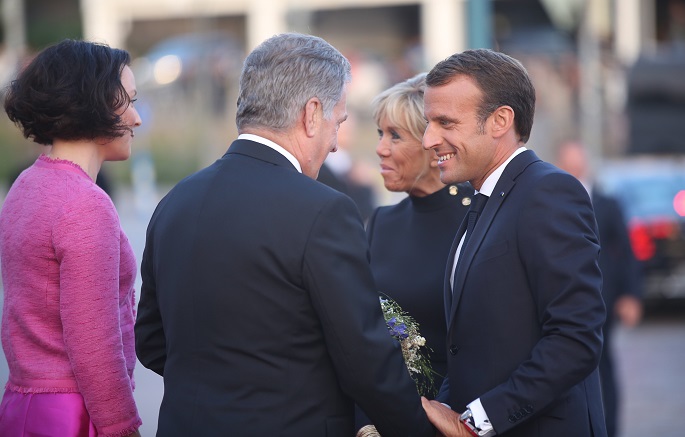Macron's confidence about defense unity raises questions
Published : 31 Aug 2018, 21:11
Updated : 31 Aug 2018, 21:27
The effort to seek stronger European solidarity in defense by French President Emmanuel Macron has been welcomed in Finland during his two-day visit that ended on Thursday.
In Friday's comments, Finnish media have believed his gesture would possibly bring about a new defense alliance in Europe, but some experts have cautioned that an actual functioning system is still far in the future.
JOINT DECLARATION
Finland and France issued a joint declaration on defense during Macron's visit, and some comments given by Macron in the press conferences in Helsinki were even more impressive than the declaration.
In the declaration, Finland and France underlined the goal of creating "stronger autonomous" European military preparedness by the next decade, adding that the goal must be based on the strong European defense industries and on shared instruments of financing.
The two countries called for "the emergence of a genuine common European strategic culture based on defense cooperation with agreed mutual dependence."
The declaration defined that "all bilateral or multilateral cooperation must make it possible to deal head-on with the terrorist threat, hybrid threats and power policies."
Finland and France said that the intervention initiative launched by France aims at promoting the birth of a joint European strategic culture and to strengthen the ability of Europeans to react jointly to threats, in addition to "existing frameworks, including EU or NATO operations".
AUTOMATIC DEFENSE
At a press conference after meeting President Sauli Niinistö, Macron said that existing agreements must be renewed so that there would be "an almost automatic" solidarity and "solidarity interventions" would take place, if an EU country is attacked".
Finnish language newspaper Aamulehti asked in its editorial on Friday whether the use of the word "automatic" by Macron actually signaled that the birth of a European defense alliance was put into words in Helsinki. The editorial added it remains to be seen whether Macron said it somewhat sloppily or really meant it.
Tommi Koivula, a researcher of the National Defense Academy, said on national radio Yle on Friday "a lot has to happen" before an automatic cooperation would be in place.
Koivula said the assistance clause in the EU Lisbon Treaty is not very important to many EU countries, as they think defense is handled through NATO. But Finland and France are two EU countries that have accentuated European security.
Koivula said any automatic assistance -- as mentioned by Macron in Helsinki -- would require that a system be built instead of the current understanding that individual countries have to defend on their own.
Matti Pesu, a researcher at the Finnish Institute for International Affairs, said the EU is important in terms of security for such a country like Finland which has no security guarantees from anywhere else.
INTERVENTION INITIATIVE
After Finland expressed earlier in August its interest in joining the French intervention defense plan, Macron said on Wednesday France wants also Sweden and Norway to join the initiative.
Analysts believed that Finland is likely to be only a strategic companion in the French led grouping, as Finland would not have much opportunity to provide actual combat forces for operations.
Finnish commentators noted that Finland is not committed to anything yet, although it is part of several other defense cooperation systems. It is part of a British joint fast reaction force and is part of a German led cluster. An agreement with Sweden has just been signed, and there is extensive cooperation with NATO and the U.S..
Observers said France was not very pleased with the way the permanent military cooperation structure of the EU was built up recently. The EU system currently reflects the German preference on building long term capabilities first, but France wants something more concrete and troops to send.
The visit to Finland got some impetus from the French domestic situation, noted Anna-Stiina Heikkila, a specialist in France at Finland's national broadcaster Yle. Heikkila said Macron is in a hurry as he wants to get the economic and defense policy reforms of the EU under way ahead of the European election campaigns in 2019.


